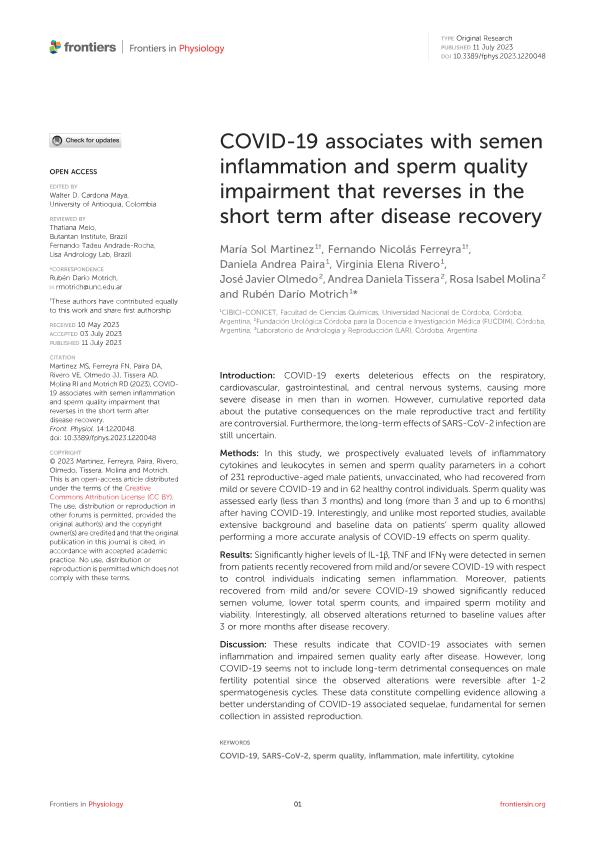Mostrar el registro sencillo del ítem
dc.contributor.author
Martinez, María Sol

dc.contributor.author
Ferreyra, Fernando Nicolás

dc.contributor.author
Paira, Daniela Andrea

dc.contributor.author
Rivero, Virginia Elena

dc.contributor.author
Olmedo, José Javier
dc.contributor.author
Tissera, Andrea Daniela

dc.contributor.author
Molina, Rosa Isabel

dc.contributor.author
Motrich, Ruben Dario

dc.date.available
2024-02-07T15:27:14Z
dc.date.issued
2023-07
dc.identifier.citation
Martinez, María Sol; Ferreyra, Fernando Nicolás; Paira, Daniela Andrea; Rivero, Virginia Elena; Olmedo, José Javier; et al.; COVID-19 associates with semen inflammation and sperm quality impairment that reverses in the short term after disease recovery; Frontiers Media; Frontiers in Physiology; 14; 7-2023; 1-10
dc.identifier.issn
1664-042X
dc.identifier.uri
http://hdl.handle.net/11336/226173
dc.description.abstract
Introduction: COVID-19 exerts deleterious effects on the respiratory, cardiovascular, gastrointestinal, and central nervous systems, causing more severe disease in men than in women. However, cumulative reported data about the putative consequences on the male reproductive tract and fertility are controversial. Furthermore, the long-term effects of SARS-CoV-2 infection are still uncertain. Methods: In this study, we prospectively evaluated levels of inflammatory cytokines and leukocytes in semen and sperm quality parameters in a cohort of 231 reproductive-aged male patients, unvaccinated, who had recovered from mild or severe COVID-19 and in 62 healthy control individuals. Sperm quality was assessed early (less than 3 months) and long (more than 3 and up to 6 months) after having COVID-19. Interestingly, and unlike most reported studies, available extensive background and baseline data on patients’ sperm quality allowed performing a more accurate analysis of COVID-19 effects on sperm quality. Results: Significantly higher levels of IL-1β, TNF and IFNγ were detected in semen from patients recently recovered from mild and/or severe COVID-19 with respect to control individuals indicating semen inflammation. Moreover, patients recovered from mild and/or severe COVID-19 showed significantly reduced semen volume, lower total sperm counts, and impaired sperm motility and viability. Interestingly, all observed alterations returned to baseline values after 3 or more months after disease recovery. Discussion: These results indicate that COVID-19 associates with semen inflammation and impaired semen quality early after disease. However, long COVID-19 seems not to include long-term detrimental consequences on male fertility potential since the observed alterations were reversible after 1-2 spermatogenesis cycles. These data constitute compelling evidence allowing a better understanding of COVID-19 associated sequelae, fundamental for semen collection in assisted reproduction.
dc.format
application/pdf
dc.language.iso
eng
dc.publisher
Frontiers Media

dc.rights
info:eu-repo/semantics/openAccess
dc.rights.uri
https://creativecommons.org/licenses/by/2.5/ar/
dc.subject
COVID-19
dc.subject
CYTOKINE
dc.subject
INFLAMMATION
dc.subject
MALE INFERTILITY
dc.subject
SARS-COV-2
dc.subject
SPERM QUALITY
dc.subject.classification
Otras Medicina Clínica

dc.subject.classification
Medicina Clínica

dc.subject.classification
CIENCIAS MÉDICAS Y DE LA SALUD

dc.title
COVID-19 associates with semen inflammation and sperm quality impairment that reverses in the short term after disease recovery
dc.type
info:eu-repo/semantics/article
dc.type
info:ar-repo/semantics/artículo
dc.type
info:eu-repo/semantics/publishedVersion
dc.date.updated
2024-02-06T13:37:53Z
dc.journal.volume
14
dc.journal.pagination
1-10
dc.journal.pais
Estados Unidos

dc.description.fil
Fil: Martinez, María Sol. Consejo Nacional de Investigaciones Científicas y Técnicas. Centro Científico Tecnológico Córdoba. Centro de Investigaciones en Bioquímica Clínica e Inmunología; Argentina
dc.description.fil
Fil: Ferreyra, Fernando Nicolás. Consejo Nacional de Investigaciones Científicas y Técnicas. Centro Científico Tecnológico Córdoba. Centro de Investigaciones en Bioquímica Clínica e Inmunología; Argentina
dc.description.fil
Fil: Paira, Daniela Andrea. Consejo Nacional de Investigaciones Científicas y Técnicas. Centro Científico Tecnológico Córdoba. Centro de Investigaciones en Bioquímica Clínica e Inmunología; Argentina
dc.description.fil
Fil: Rivero, Virginia Elena. Consejo Nacional de Investigaciones Científicas y Técnicas. Centro Científico Tecnológico Córdoba. Centro de Investigaciones en Bioquímica Clínica e Inmunología; Argentina
dc.description.fil
Fil: Olmedo, José Javier. No especifíca;
dc.description.fil
Fil: Tissera, Andrea Daniela. No especifíca;
dc.description.fil
Fil: Molina, Rosa Isabel. No especifíca;
dc.description.fil
Fil: Motrich, Ruben Dario. Consejo Nacional de Investigaciones Científicas y Técnicas. Centro Científico Tecnológico Córdoba. Centro de Investigaciones en Bioquímica Clínica e Inmunología; Argentina
dc.journal.title
Frontiers in Physiology
dc.relation.alternativeid
info:eu-repo/semantics/altIdentifier/url/https://www.frontiersin.org/articles/10.3389/fphys.2023.1220048/full
dc.relation.alternativeid
info:eu-repo/semantics/altIdentifier/doi/http://dx.doi.org/10.3389/fphys.2023.1220048
Archivos asociados
